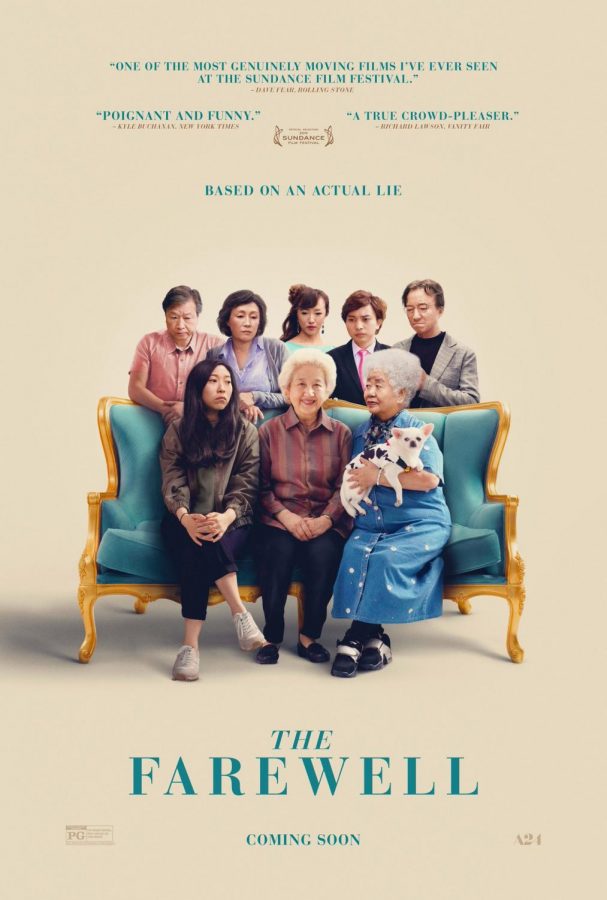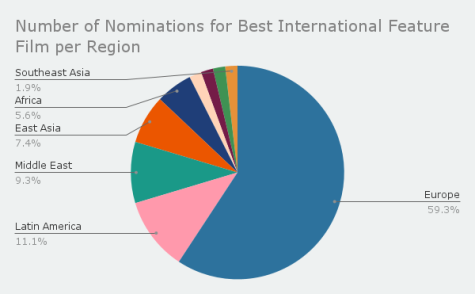‘The Farewell’: A Tale of Love and Lies
December 20, 2019
“Based on an actual lie.”
The tagline for Lulu Wang’s film, “The Farewell,” sets the tone for the whole film.
“The Farewell” follows young Billi, played by Awkwafina, as she travels to China from New York in order to say goodbye to her dying grandmother who has been diagnosed with lung cancer and is predicted to only have a few months left. One important note, however—the grandmother, Nai Nai, is not aware of her diagnosis. As a way to say goodbye to Nai Nai without informing her of her sickness, the family prepares to throw a fake wedding which would force all of them to return to China.
In China, it is not uncommon for a family member to lie to another regarding their physical well-being and health. Oftentimes, if a family member is diagnosed with a terminal illness, their family will choose to keep the diagnosis from them in order to prevent additional stress or concern.
The beauty of “The Farewell” is the authenticity director Lulu Wang brings to the film. The whole story is based on Wang’s own life and what she and her family went through when her grandmother was diagnosed with cancer. In order to maintain this sense of truth and reality, Wang primarily utilizes static, wide shots so that the audience is able to see the whole picture.
There are no unnecessary movements or zooms and almost every scene stays focused on the characters, further emphasizing the character-driven story and the setting, China. The film was almost solely shot in Changchun, China, with just a few scenes being shot in New York City. When a film is shot on location, there is a feeling of truth and realism that can both be seen on screen and felt by the audience.
Every shot in this film is a work of art. In every scene, Wang perfectly balances the characters and setting so to never make the frame seem overcrowded or unclear. The wide shots in this film make you an observer of the family, as it is from a perspective that is far enough away that you do not feel like a part of it, but you are still able to pick up on every individual character’s emotions.
Wang was arguably snubbed for a Golden Globe nomination for best director. However, it is not just the directing that sets “The Farewell” apart from other films, but the chemistry between the two main characters, Billi and Nai Nai. Awkwafina and Shuzhen Zhou fully embody their characters and create this genuine granddaughter-grandma relationship.
The two speak to each other mostly in Mandarin, so for many English speakers, the actresses’ facial expressions and body language are critical, and together, Awkwafina and Zhou succeed in creating a relationship that transcends dialogue. From the way Awkwafina looks at Zhou in a certain way, with both fear and love, or how Zhou holds Awkwafina in a familiar, maternal way, the audience is able to feel the emotions of the characters, whether or not they understand Mandarin.
Like many international films, “The Farewell” does have English captions to accompany the dialogue, but reading captions is still very different from hearing the dialogue that is familiar to you. The language barrier that many audience members will face while watching this film is all the more reason why the actresses’ performances are so important.
Awkwafina’s performance is not to be overlooked in this film. Personally, as a student learning Mandarin, I understand how challenging the language can be to learn. Being able to do an entire film in Mandarin, which Awkwafina had to learn for the film, is an impressive feat that should not go unnoticed. Her Mandarin may not be perfect, but it is perfect for her character, who is in more ways than one, stuck between two cultures.
She delivers an incredible performance throughout the film as Billi, playing the role of the conflicted, scared granddaughter who is unsure whether or not lying to Nai Nai about her sickness is for better or worse. As Billi is Chinese-born but Western-raised, she has differing opinions from the rest of her family and adds another level of complexity to the already complex family.
It is hard to believe watching this film that “The Farewell” is her first time acting in a drama, as the root of her career has been comedy. The Awkwafina you see in this film is immensely different from the one you see in “Crazy Rich Asians” or “Ocean’s 8.” Nevertheless, her performance illustrates her multitalented self and her capabilities as an actress.
Because of her outstanding performance in “The Farewell,” Awkwafina earned a Golden Globe nomination for Best Actress, alongside titans in the industry like Emma Thompson and Cate Blanchett. The film as a whole is also up for Best Foreign Language Film.
Coming from a half-Asian family, this was a film that spoke to me on a very personal level. There were so many aspects of the film that reflected moments from my life and made it all the more authentic. In one scene where the family is enjoying dinner, Nai Nai tells Billi to eat more and comments on how she has lost weight. In my own life, whenever I have meals with my Asian grandparents, they always comment on how I’m not eating enough, which is very similar to Billi and her Nai Nai.
It has only been in recent years that Asian-Americans have played lead roles in films and this film shows the beauty of diversity. Not only is “The Farewell” diverse in terms of race, but it is a diverse story as a whole. The story in this film is one that has never been told before and one that incorporates a variety of themes and stories. Alongside the main story of Nai Nai being sick, you have Billi’s personal struggle in her career and internal struggle being stuck between her American upbringing and Asian roots.
Overall, “The Farewell” is a story that comes from the heart and one that is rooted in family. It takes you on an emotional rollercoaster, with scenes that will make your stomach hurt from laughing and scenes that will make you cry uncontrollably. Despite a majority of the film being in Mandarin, it is still worth the watch, whether you can speak the language or not. Just make sure you have your tissues ready.












